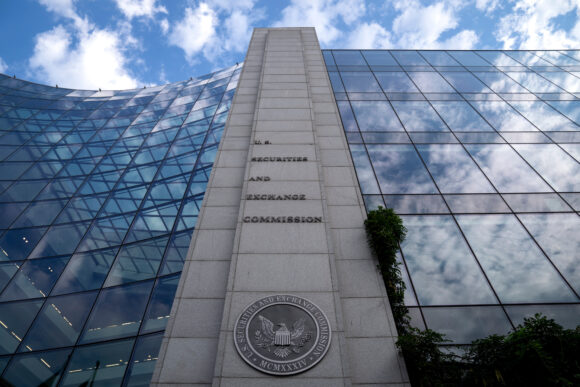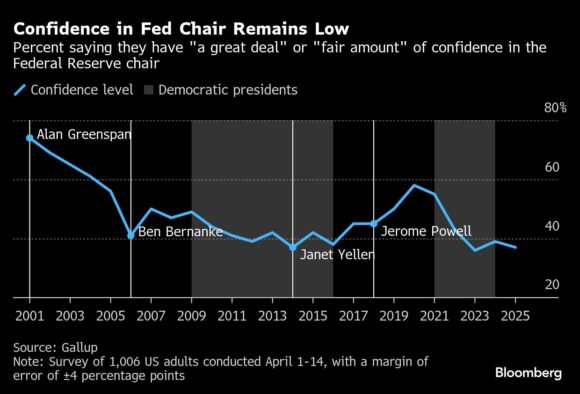The White House is stepping up its efforts to bring independent agencies — including the Securities and Exchange Commission and the Commodity Futures Trading Commission — under its control, requiring allies of President Donald Trump to approve all new regulations beginning Monday.
New guidance from the Office of Information and Regulatory Affairs, delivered to agencies Thursday, implements a February executive order that sought to end the independence of entities that regulate a broad range of economic activity, including energy, labor, media and consumer products.
The executive order applies to at least 20 boards, commissions and other agencies that were set up by Congress to be largely independent from direct presidential control. But under an interpretation of the Constitution favored by Trump — known as the unitary executive theory — the president has the power to supervise and control the entire executive branch.

The 25-page memo from acting OIRA administrator Jeffrey Clark instructs independent agencies to involve the White House regulatory office at all stages of rulemaking. It requires independent agencies to appoint a regulatory policy officer — generally a political appointee — by Monday.
The effort would reflect a fundamental restructuring of how formerly independent agencies implement and enforce federal laws, subjecting them to the same White House oversight that other agencies have had since at least former President Bill Clinton.
Many of those agencies have an additional complication, in that they’re run by multi-member boards or commissions. Under the guidance, those commissions may not publicly discuss proposed regulations until they’re approved by the White House.
The Federal Reserve’s monetary functions — that is, the work of the Federal Open Markets Committee — remain independent under Trump’s order and the draft guidance. But any rules as a banking regulator must be submitted to the White House for review.
Read More: Trump Studying Whether Removing Powell Is Option, Hassett Says
Still, the Federal Reserve presents a particular legal challenge for Trump. Peter Shane, a law professor emeritus at The Ohio State University, said the Supreme Court has likely stopped short of fully adopting Trump’s embrace of the unitary executive theory because it would undermine Fed independence and destabilize global markets.
“Holding the United States unable to have an independent agency controlling the money supply would be an extreme move,” Shane wrote recently in Washington Monthly. Applying Trump’s order only to banking regulation doesn’t completely solve that problem. “Members of the Fed cannot be half-fired, half-empowered,” he said.

There could also be practical effects. Jane Rueger of the Perkins Coie law firm argued that independent agencies like the Federal Energy Regulatory Commission often engage in “complex, nuanced, and highly technical proceedings” — and that adding an extra layer of review could lead to delays and uncertainty. Perkins Coie is one of the firms Trump has sanctioned over its diversity policies and its work with Democrats, actions it is challenging in court.
Clark’s guidance argues that involving OIRA early in the process can help coordinate rulemaking with other agencies and speed up rules adoption.
Other financial regulators affected include the Federal Deposit Insurance Corporation, Office of the Comptroller of the Currency and the Consumer Financial Protection Bureau, which has been largely dismantled by Elon Musk’s Department of Government Efficiency.
Also included is the Federal Election Commission, the bipartisan campaign finance regulator established by Congress after the Watergate scandal to ensure that presidents wouldn’t have undue influence over investigations into political campaigns. Trump’s inclusion of the FEC in his February executive order led to a lawsuit by the Democratic Party, which called it an “unprecedented assertion of presidential power.”
Was this article valuable?
Here are more articles you may enjoy.


 Allstate CEO Wilson Takes on Affordability Issue During Earnings Call
Allstate CEO Wilson Takes on Affordability Issue During Earnings Call  Trump’s Repeal of Climate Rule Opens a ‘New Front’ for Litigation
Trump’s Repeal of Climate Rule Opens a ‘New Front’ for Litigation  A 10-Year Wait for Autonomous Vehicles to Impact Insurers, Says Fitch
A 10-Year Wait for Autonomous Vehicles to Impact Insurers, Says Fitch  Insurify Starts App With ChatGPT to Allow Consumers to Shop for Insurance
Insurify Starts App With ChatGPT to Allow Consumers to Shop for Insurance 

